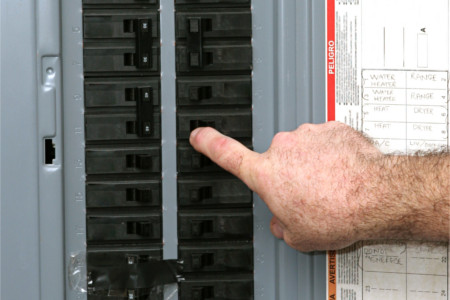Why Do Circuit Breakers Trip

When a circuit breaker trips in your New Haven home, you’ll have to go outside, out to the garage, or down to your basement in order to switch it back and get the power back on. This can be extremely frustrating, especially if it’s happening over and over again. And if it is happening frequently, you should think twice before you continue to switch the breaker back on.
It’s important to understand why circuit breakers trip so that you can understand what kind of danger your home might be in if this is becoming a recurring problem. The New Haven electrician professionals at Electrical Services Group LLC have broken down the reasons that a circuit breaker may trip so that you can respond accordingly.
First, What is “Tripping”?
Circuit breakers “trip” in order to cut off the flow of electricity, which keeps circuits from overheating and potentially causing a tremendous amount of damage. If circuit breakers didn’t trip, house fires would be a much more common and significant problem.
Before you go back out to switch a breaker back on again one more time, you’ll want to consider why the breaker is tripping, or you could end up allowing your electrical system to do a significant amount of damage to your New Haven home.
The three most common reasons a circuit breaker trips are:
- Short Circuits
- Overloaded Circuits
- Ground Fault Surges
Here is a quick look at what those terms mean for you, what they mean to your home, and what you can do prevent more damage:
Circuit Overloads
The number one cause of breakers tripping is an overloaded circuit. This simply means that you’re asking a particular circuit to provide more electricity to your home that is has the capacity for, which is in turn causing the circuit to overheat.
If you’re running a computer and a television through the same circuit, using 20 amps of electricity in a circuit that was meant to run 15 amps, the circuit breaker trips to prevent the circuit from possibly overheating and catching fire.
There are a couple of different ways to solve this problem. You should first try to redistribute your devices so that there are not too many on the same circuit. You may also want to keep some electrical devices turned off to reduce the electrical load.
Short Circuits
Short circuits are another common cause, and they can be more dangerous to your New Haven home.
A short circuit occurs when a “hot” wire comes into contact with a “neutral wire” in one of your outlets. When this happens, a large amount of the current flows, which creates more heat than the circuit can handle. Again, the circuit shuts off to prevent any dangerous outcomes.
Short circuits should be recognizable by the smell of burning they leave behind. You may also notice a brown or black discoloration in the area. They may be caused by wiring problems, and you have an electrical safety inspection performed as soon as possible.
Ground Fault Surges
Short circuits and ground fault surges are very similar.
A ground fault happens when a hot wire touches a ground wire, or when the side of a metal outlet box is connected to the ground wire. Just like with a short circuit, you should be able to see a discoloration around your outlet if a ground fault surge has occurred.
All of these problems can cause huge amounts of damage to your New Haven home if they aren’t dealt with properly. If your breakers continue to trip frequently, call our professional New Haven electrician as soon as possible to have your electrical system inspected.
